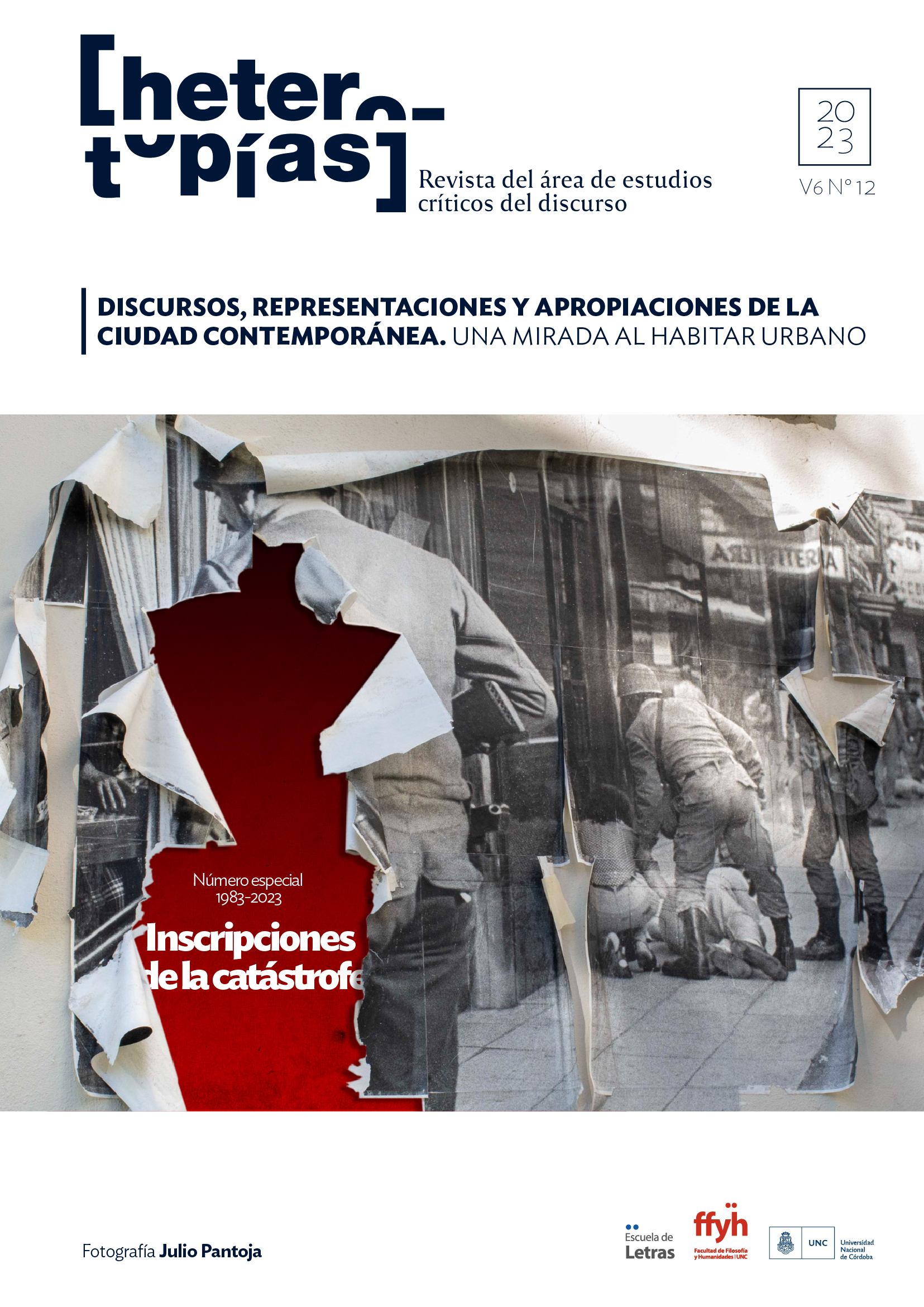The neoliberal city revisited Codes, urbans agreements, and social conflicts. The State at the service of the real estate market. Argentina (2012-2022)
Main Article Content
Abstract
After the result of the PASO On August 13, 2023 in Argentina, the most voted force in the figure of Javier Milei, opens the possibility of the return of neoliberalism to the government and a review is timely. Neoliberalism has been evolving in the world for more
than eighty years; During this time, it has deployed its postulates in various forms of territorialization. Cities have represented a privileged scale for its reproduction. It is proposed in this article to make an extract of its postulates and historical evolution based
on a bibliographic review. It is complemented by the analysis of the instruments for applying neoliberal urban policies: “a new generation of urban codes” and “urban agreements”. Comparative studies are collected from the cities of Buenos Aires,
Córdoba and Rosario in Argentina between 2012 and 2022. The new codes and urban planning agreements are constituted as urban management instruments that articulate specific arrangements established between development companies and the city
government. The objective is to observe the impact of this instrument between the years 2012-2022, and its implementation in these three cities in relation to social conflict. Finally, it is concluded that the territorialization of the neoliberal city through this
instrument has led to channeling a strong flow of capital from other formal and informal sectors of the economy; and on the other hand to the establishment of exclusive highend territories within the cities; generating more inequality, fragmentation due to
accumulation of exceptions, since these agreements are approved under a tax collection logic, with strong social segregation, and territorial imbalances. It has accentuated conflict between neighbors, where the unequal territorialization of neoliberal projects is
manifested, characterized by their variable, multi-scalar and interconnected geographic matrix.
Downloads
Article Details

This work is licensed under a Creative Commons Attribution-NonCommercial-ShareAlike 4.0 International License.
Those authors who have publications with this journal, accept the following terms: Those authors who have publications with this journal, accept the following terms:
a. The authors will keep their copyright and guarantee to the journal the right of first publication of their work, which will be simultaneously subject to the Creative Commons Attribution - Non-Commercial - Share Alike (by-nc-sa) Attribution License; no commercial use of the original work or any derivative works is allowed, the distribution of which must be done with a license equal to the one that regulates the original work.
b. Authors may adopt other non-exclusive license agreements for the distribution of the published version of the work (e.g., deposit it in an institutional telematic archive or publish it in a monographic volume) provided that the initial publication in this journal is indicated.
c. Authors are allowed and recommended to disseminate their work through the Internet (e.g. in institutional telematic archives or on their website) before and during the submission process, which may lead to interesting exchanges and increase the number of citations of the published work. (See The effect of open access).
References
Baraona, Pablo (1990) “Chile en el último siglo” en Memoria Chilena. Biblioteca nacional de Chile.
Basualdo, E. (2006a). La reestructuración de la economía argentina durante las últimas décadas. De la sustitución de importaciones a la valorización financiera. En E. Basualdo y E. Arceo, Neoliberalismo y sectores dominantes. Tendencias globales y experiencias nacionales. Buenos Aires: CLACSO.
Basualdo, E. (2006b). Estudios de historia económica argentina. Desde mediados del siglo XX a la actualidad. Buenos Aires: Siglo XXI.
Brenner, N. (2013) “Tesis sobre la urbanización planetaria”. Nueva Sociedad, N° 243, p
Brenner, Neil y PECK, Theodore, (2017) “Las ciudades y las geografías del neoliberalismo realmente existente”, Ed. Álvaro Sevilla (España: Editorial Icaria).
Canitrot, A. (1981) “Teoría y práctica del liberalismo. Política antiinflacionaria y apertura económica en la Argentina, 1976-1981”. Desarrollo Económico, 21 (82), 131-189.
Castro, Sergio (1976) “El ladrillo. Bases de la política económica del gobierno militar chileno”. Centro de Estudios Públicos. Santiago de Chile.
Cuenya, Beatriz (2009): Recuperación de plusvalías urbanas. Aspectos conceptuales y gama de instrumentos, Lincoln Institute of Land Policy y Municipalidad de Rosario, Rosario.
De Castro, Baraona, y Bardón, et. all. (1972) “Conformación de la ideología neoliberal en Chile (1955-1978)”. En Memoria Chilena,
Escalante, (2016) “Historia mínima del neoliberalismo” Editorial, Turner; 1er edición Buenos Aires.
De Mattos, Carlos (2010) “Una nueva geografía latinoamericana en el tránsito de la planificación a la gobernanza, del desarrollo al crecimiento”. EURE, 36, 108, De Mattos, C. (2007) “Globalización, negocios inmobiliarios y transformación urbana”. Nueva
Sociedad, 2007, p. 82 - 96.
Ferrer, A. (1981) “Nacionalismo y orden constitucional”. Buenos Aires: Fondo de Cultura Económica. Ferrer, A. (2012) “La construcción del Estado neoliberal en la Argentina”. Paris. file:///C:/Users/carol/Downloads/La_construccion_del_Estado_neoliberal_en.pdf
Franquesa, Jaume (2007) “Vaciar y llenar, o lógica espacial de la neoliberalización”, Revista Reis, n. 118 (2007): 127.
González, C. (2020) “El vaciamiento que antecede la renovación. Reflexiones a partir del proyecto del distrito gubernamental en el sur de la ciudad de Buenos Aires”, Revista Territorios, N.° 42 (2020): 1-22.
Harvey, D. (2004) “El nuevo imperialismo: acumulación por desposesión”. En El “nuevo” desafío imperial. Social register 2004, editado por Leo Panitch y Colin Leys. Buenos Aires: CLACSO, 2005.
Harvey, D. (2007) “Espacios del capital. Hacia una geografía crítica”. España: Edi. Akal.
Janoschka, M. (2002). “El nuevo modelo de ciudad latinoamericana: fragmentación y privatización”. EURE, 28, 85, 11-20. LEY Nº 9. 841. [2010]
Janoschka, M. e Hidalgo, R. (Ed.) [2002] “La ciudad neoliberal. Gentrificación y exclusión en Santiago de Chile”, Buenos Aires, Ciudad de México y Madrid. Universidad Católica de Chile.
Jimenez-Corrales, A. (2021) “Rutas teóricas para estudiar ciudades neoliberales: Un acercamiento desde la territorialización”. Revista Espiga, 21 (41), páginas 48-67.
Klein, Naomi (2007) “La doctrina del shock”, Editorial Paidós.
Liborio, M. (2010). La vivienda agrupada y colectiva de gestión privada en Córdoba. Aportes para su revisión disciplinar. (2001-2008). MDAU. FAUD- UNC. Tesis de maestría
Liborio, M. (2019). La ciudad bajo el signo del neoliberalismo, privatopía, extraterritorialidad y extractivismo urbano.
